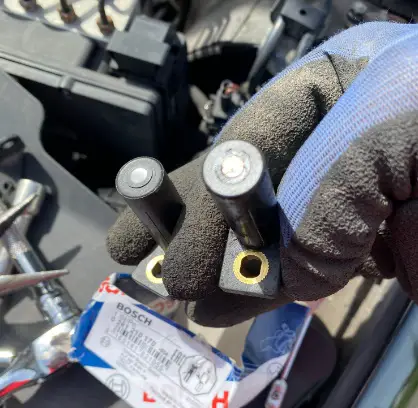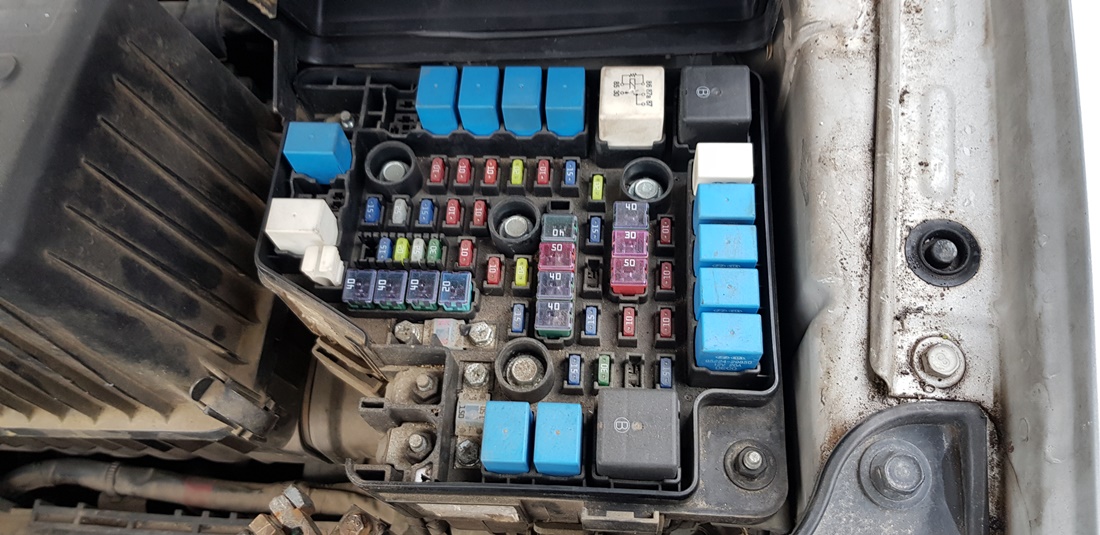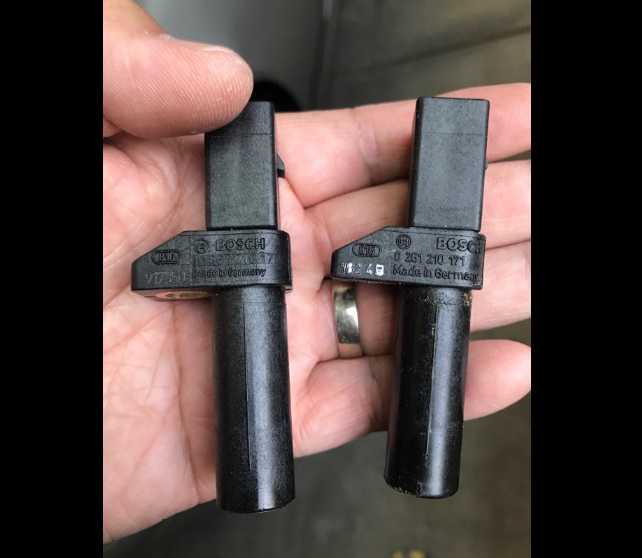I was driving my car the other day and out of nowhere, my steering wheel became stiff. It was really hard to turn the steering wheel. It felt like I was wrestling with an alligator. When this kind of thing happens to you for the first time, you immediately suspect a flat tire.
So, I pulled over and checked all of my tires which were fine. Then, I got back into the car and started to turn the wheel left and right, and I could really hear some grinding and whining noises while I struggled to turn it.
Now, if this has happened to you and you want to know what can cause heavy or stiff steering, read on as I go into the most common reasons. This type of issue doesn’t occur very often, but it can happen to anyone.
- Key Takeaway
- What Is Heavy Steering?
- What Can Cause Heavy or Stiff Steering?
- How Do You Fix a Steering Wheel That Is Hard To Turn?
- FAQs
- Q: What can cause heavy or stiff steering?
- Q: What is the common cause of heavy steering?
- Q: Why is my steering wheel hard to turn?
- Q: What can cause the steering wheel to become stiff?
- Q: Why is it hard to turn the steering wheel at low speeds?
- Q: What are the 5 reasons for heavy or stiff steering?
- Q: How can I avoid heavy steering?
- Q: What should I do if my steering wheel is hard and stiff?
- Q: How do I make a turn if my steering wheel is hard to turn?
- Q: What should I do if there is liquid in the power steering system?
- In Conclusion
Key Takeaway
- Heavy or stiff steering can be caused by incorrect tire pressure, the vehicle sitting for too long which can cause many steering parts to become seized, worn out belt that drives the power steering pump, low or dirty power steering fluid, improper front wheel alignment, or failing steering components.
- Fixing a steering wheel that is hard to turn typically involves checking and adjusting tire pressure, topping up or replacing the power-steering fluid, fixing any leaks in the power-steering system, repairing or replacing a faulty power steering pump, or replacing a cracked or broken serpentine belt.
What Is Heavy Steering?
Heavy steering is a term used to describe a situation where more effort than usual is needed to turn the steering wheel of a vehicle.
This can occur due to various reasons such as low power steering fluid, a malfunctioning power steering pump, problems with the steering rack, or issues with the car’s wheel alignment.
It’s crucial to address heavy steering promptly as it not only makes the vehicle harder to control, especially at lower speeds but can also be indicative of more serious underlying problems that could lead to costly repairs if left unchecked.
What Can Cause Heavy or Stiff Steering?
- Incorrect tire pressure
- The vehicle has been sitting for too long
- Worn out belt that drives the power steering pump
- Low or contaminated power steering fluid
- Improper wheel alignment
- Failing steering components
1. Incorrect tire pressure

Incorrect tire pressure can cause heavy or stiff steering. This might seem like an obvious one, but trust me, tire pressure is the most commonly overlooked issue.
So, starting out with issue number one is incorrect tire pressure. Low tire pressure causes excessive resistance due to higher friction not allowing the steering to move freely.
Typically, the recommended tire pressure is between 30 to 35 PSI. A good generic value is 32 PSI. However, this can vary between vehicles and tire types.
The tire pressure specific to your vehicle can be found in your owner’s manual, or on the information tag on your door jamb.
2. Vehicle has been sitting for too long

A vehicle that has been sitting for too long can definitely have issues with the steering. If your vehicle has been sitting for an extended period of time, your steering components can become somewhat seized.
That can be either from rust or, the lubrication has dried out. This can include anything from the steering column assembly, all the way down to your ball joints or tie rods.
You can apply lubricating oil on some of the bushings which are found on the steering column. You can also apply lubricating oil on splines and small universal joints.
However, some of the universal joints may have seals to keep out dirt and this will prevent any oil from getting into the joint. Others may have grease fittings such as ball joints or tie rods. This means that they are serviceable components.
Always use a ball joint-compatible grease when greasing these components and do not apply more than three pumps of grease. Pump the grease gun slowly and watch the boot slightly move. Then, stop and move on to the next joint.
Too much grease can break the seals on these boots allowing the grease to escape and having foreign contaminants enter the joint causing a premature failure.
If you have no serviceable components, the stiffness may eventually disappear after some usage. You can use a grease needle on non-serviceable joints, but it’s not something I typically recommend.
This can cause premature failure because once that boot has a puncture from the needle, it can grow due to rubber deterioration. This will allow grease to escape and dirt to enter.
3. Worn out belt that drives the power steering pump

A worn-out belt that drives the power steering pump can cause stiff or heavy steering. If you hear a squeaking noise after you turn the steering wheel, the issue could be the belt that is driving the power steering pump. In most cases, the belt is loose.
A loose belt can be caused by it being worn and stretched which will require replacing.
Replacing the belt with a new one is probably the best option. The belt simply needs to be adjusted manually if your vehicle does have an adjustment. While you are at it, you may have a worn tensioner that is not maintaining sufficient pressure on the belt.
4. Low or contaminated power steering fluid

Low or contaminated power steering fluids can cause heavy or stiff steering. If your vehicle is equipped with power steering, your power steering fluid may be low, or a replacement is required.
When there is a fluid-related issue, this typically results in a whining power steering pump. But, with that being said, the pump can also be failing too.
The pump may whine when the vehicle is idling and usually worsens when operating the steering. Fluid level checking procedures can vary between vehicles.
There are also maintenance intervals for fluid replacements as well. This information should be outlined in your vehicle’s owner’s manual. If your vehicle is equipped with a filter for the power steering fluid, it’s best if you change that as well.
5. Improper wheel alignment

Improper alignment can also cause stiff steering. The toe angle and caster angle can affect your steering operation.
Different angles can cause the steering to fight against each other, or excessive positive cast or angle, while it improves straight-line stability, will create harder steering operation.
6. Failing steering components

Failing components in the steering system can cause heavy or stiff steering. This could be something less costly to replace, such as a ball joint or tie road. As I mentioned before, these components have a rubber booth which is intended to keep lubrication in and dirt out of the joint.
Of course, with time, these boots will eventually become worn out and will allow foreign contaminants to enter and thus prevent the steering from operating smoothly.
Depending on what your vehicle is equipped with, a more costly issue you can have is a failing power steering pump, failing steering rack, or steering box.
A failing steering pump makes a whining sound which is pretty easy to distinguish. However, a steering rack or box can sometimes be a little harder to diagnose. You may notice excessive play when operating the steering says Cars From Japan.
Perhaps even a grinding noise when turning.
How Do You Fix a Steering Wheel That Is Hard To Turn?
- Check the power steering fluid level: If it’s low, replenish it to the correct level.
- Inspect the power steering pump: If it’s faulty or damaged, it may need to be repaired or replaced.
- Examine the drive belt: If it’s loose or worn out, it should be tightened or replaced.
- Check the power steering system for leaks: If any are found, the leaking component should be replaced.
- Inspect the steering rack: If it’s damaged, it may need to be replaced.
- Check wheel alignment: If the wheels are not correctly aligned, you may need to have them professionally adjusted.
- If all else fails, seek professional help: A certified mechanic can accurately diagnose and fix the problem.
FAQs
Q: What can cause heavy or stiff steering?
A: There are several factors that can cause heavy or stiff steering, including problems with the power steering system, low speeds, and issues with the steering wheel itself.
Q: What is the common cause of heavy steering?
A: One common cause of heavy steering is a problem with the power steering system. This can be caused by a low level of power steering fluid or a malfunctioning power steering pump.
Q: Why is my steering wheel hard to turn?
A: There are multiple reasons why your steering wheel may be hard to turn. One common cause is low levels of power steering fluid, which can make it more difficult to turn the wheel. Another common cause is a problem with the steering rack, which is the mechanism that connects the steering wheel to the front wheels of the car.
Q: What can cause the steering wheel to become stiff?
A: A stiff steering wheel can be caused by a variety of factors. Some possible causes include a low level of power steering fluid, a malfunctioning power steering pump, or a problem with the steering rack.
Q: Why is it hard to turn the steering wheel at low speeds?
A: Hard steering at low speeds can be caused by a few different things. One common cause is a problem with the power steering system, such as a low power steering fluid or a malfunctioning power steering pump. Another common cause is a problem with the steering rack.
Q: What are the 5 reasons for heavy or stiff steering?
A: The five common reasons for heavy or stiff steering include low levels of power steering fluid, a malfunctioning power steering pump, a problem with the steering rack, a damaged steering wheel, or problems with the power steering system.
Q: How can I avoid heavy steering?
A: To avoid heavy steering, it is important to regularly check the power steering fluid levels and ensure that they are topped up. It is also important to have the power steering system inspected and maintained regularly to prevent any issues from arising.
Q: What should I do if my steering wheel is hard and stiff?
A: If your steering wheel is hard and stiff, it is recommended to first check the power steering fluid levels to ensure they are adequate. If the fluid levels are fine, it is advisable to have the power steering system checked by a professional to identify and fix any underlying issues.
Q: How do I make a turn if my steering wheel is hard to turn?
A: If your steering wheel is hard to turn, it is important to use extra force and effort to make the turn. However, it is recommended to have the steering system inspected and repaired as soon as possible to prevent any further damage or accidents.
Q: What should I do if there is liquid in the power steering system?
A: If there is liquid in the power steering system, it is important to have the system checked by a professional as soon as possible. The liquid in the power steering system could indicate a leak or a problem with the power steering pump, which can lead to heavy or stiff steering.
In Conclusion
You may experience heavy or stiff steering when your vehicle has an accumulation of dirt, grease, and grime build-up in the steering system.
In order to prevent this issue from occurring, it’s important to regularly maintain your car and ensure that the steering components are clean and properly lubricated.




